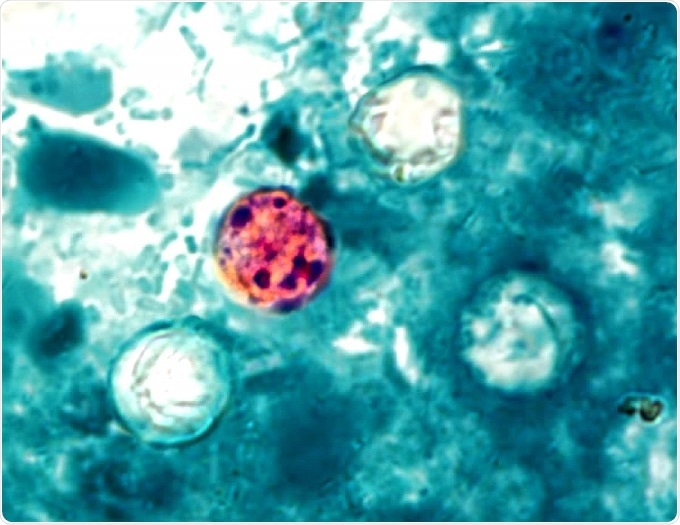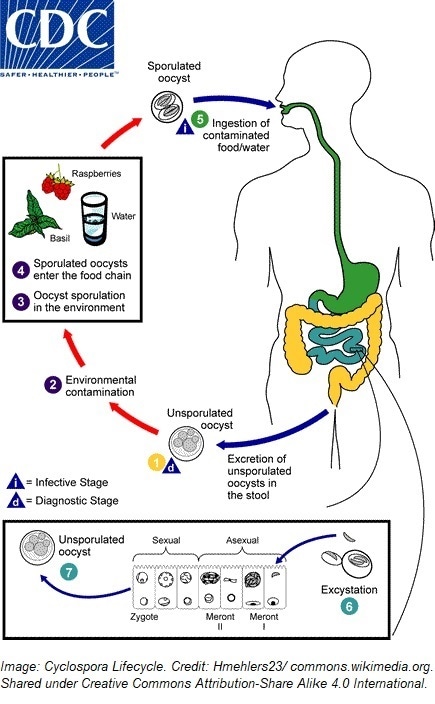The Centers for Disease Control and Prevention (CDC) has released a Health Alert Network (HAN) Health Advisory on 7th August 2017, Monday, in order to alert the health care facilities and the public health department on the increase in the reported cases of cyclosporiasis. The Health Advisory also aims at providing guidance to the healthcare providers on the rise in the reported cases.
According to the investigations done by the CDC in collaboration with the Food and Drug Administration (FDA) and the State and Local Health Departments in the U.S, a test for cyclosporiasis should be considered by the healthcare providers in patients who are affected with a prolonged or remitting-recurring diarrheal illness.
 Image: Photomicrograph of a fresh stool sample, with a presence of four Cyclospora cayetanensis oocysts in the field of view.
Image: Photomicrograph of a fresh stool sample, with a presence of four Cyclospora cayetanensis oocysts in the field of view.
In most of the laboratories in the U.S, routine diagnosing tests for Cyclospora is not done even when the stool is tested for the presence of parasites.
The HAN Health Advisory instructs the healthcare providers to request the test for Cyclospora specifically, even if the testing is ordered by molecular methods, ova and parasitic examination (O&P) or gastrointestinal pathogen panel test, as cyclosporiasis is nationally notifiable. They are also instructed to report suspicions as well as confirmed cases of the infection to the authorities of public health and contact the local health department if assistance is needed.
Cyclosporiasis, is caused by a parasite named as Cyclospora cayetanensis, and is an intestinal disease. Direct spreading of the infection from one person to another will not occur in this case; however, consumption of food and water contaminated by the parasite can make a person infected.
Watery diarrhea, which might be profuse, is the most common sign of cyclosporiasis. Anorexia, vomiting, nausea, fatigue, low-grade fever, weight loss, flatulence, abdominal cramping, myalgia, etc., are other possible symptoms. The manifestations of the symptoms usually begin 7 days after the ingestion of the parasite, but it ranges between 2 days to 2 weeks.
Cyclosporiasis, when left untreated, can last for a few days to more than a month, and can result in a remitting-relapsing course. An antibiotic is the treatment of choice for this illness as no other effective and alternative treatments are identified yet. For patients who will not be able to tolerate the antibiotic, or those who are allergic to them, symptomatic care as well as observation is recommended.
Even though cyclosporiasis affects people in many countries, it is mostly common in sub-tropical and tropical regions. In the U.S, most of the outbreaks of the disease as well as the reported cases happen in the spring and the summer months (mostly seen during May and last untill August or September) and have been associated with various kinds of fresh produce like, basil, cilantro, mesclun lettuce, raspberries, and snow peas, but canned or commercially frozen products are not identified to have a link.
In the U.S, up to 2nd August 2017, there were 206 cases of Cyclospora infection reported by the 27 states to CDC in people who are infected and became ill on or after 1st may 2017. The number of cases is thought to be relatively small from each state, and the reported cases of hospitalization were only 18. In addition, no deaths had been reported.
However, the number of cases reported in 2017 is higher than the number of cases reported by the same date in 2016. Until 3rd August 2016, the number of cases reported in people who got infected and became ill in the U.S on or after 1st May 2016 was 88, and therefore there has been an increase of 234% compared to this time last year.
As per the report, a particular vehicle of interest has not been identified yet and studies to find out a potential source of infection are still in process. As far as concerned, it is very difficult to say if the cases reported in various states are interrelated or related to the same food item(s).
Source:
- https://content.govdelivery.com/accounts/USCDC/bulletins/1af73ec